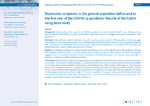Depressive symptoms in the general population before and in the first year of the COVID-19 pandemic: Results of the GEDA 2019/2020 study
Hapke, Ulfert
Kersjes, Christina
Hoebel, Jens
Kuhnert, Ronny
Eicher, Sophie
Damerow, Stefan
Background: Study results on the impact of the COVID-19 pandemic on mental health in the first year of the pandemic are contradictory. The GEDA 2019/2020 study makes it possible to examine changes in depressive symptoms in the population.
Methods: A standardised telephone interview was used to survey a random sample of the population in Germany aged 15 and older. To exclude seasonal effects, 10,220 interviewees from the period April 2019 to January 2020 were compared with 11,900 from the period April 2020 to January 2021. Depressive symptoms were assessed with the internationally established 8-item Patient Health Questionnaire (PHQ-8).
Results: The prevalence of depressive symptoms decreased from 9.2% to 7.6% in the first year of the pandemic. Changes differ between women and men as well as between age and education groups. The analysis of individual symptoms suggests that it is not about a reduction of mental disorders of the depressive type in the narrower sense, but rather a decrease in stress-associated individual symptoms.
Conclusions: The decrease in stress-associated depressive symptoms in parts of the population can be interpreted as an indication that pandemic-related changes in everyday life and the working environment may have had a positive effect on individual areas of mental health in certain groups, at least temporarily in the first year of the pandemic. The continuing strong social inequality in depressive symptoms to the disadvantage of low education groups confirms that the need for social situation-related health promotion and prevention with regard to the living and working conditions of socially disadvantaged people must not be lost sight of in times of pandemic. For groups in the population that partly showed a worsening of symptoms in this phase of the pandemic, e.g. the diminished ability to concentrate of very old men, targeted support options should be created in the future.
Files in this item

